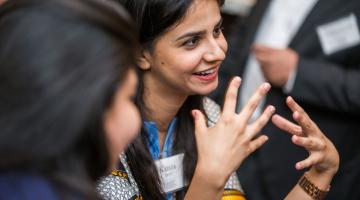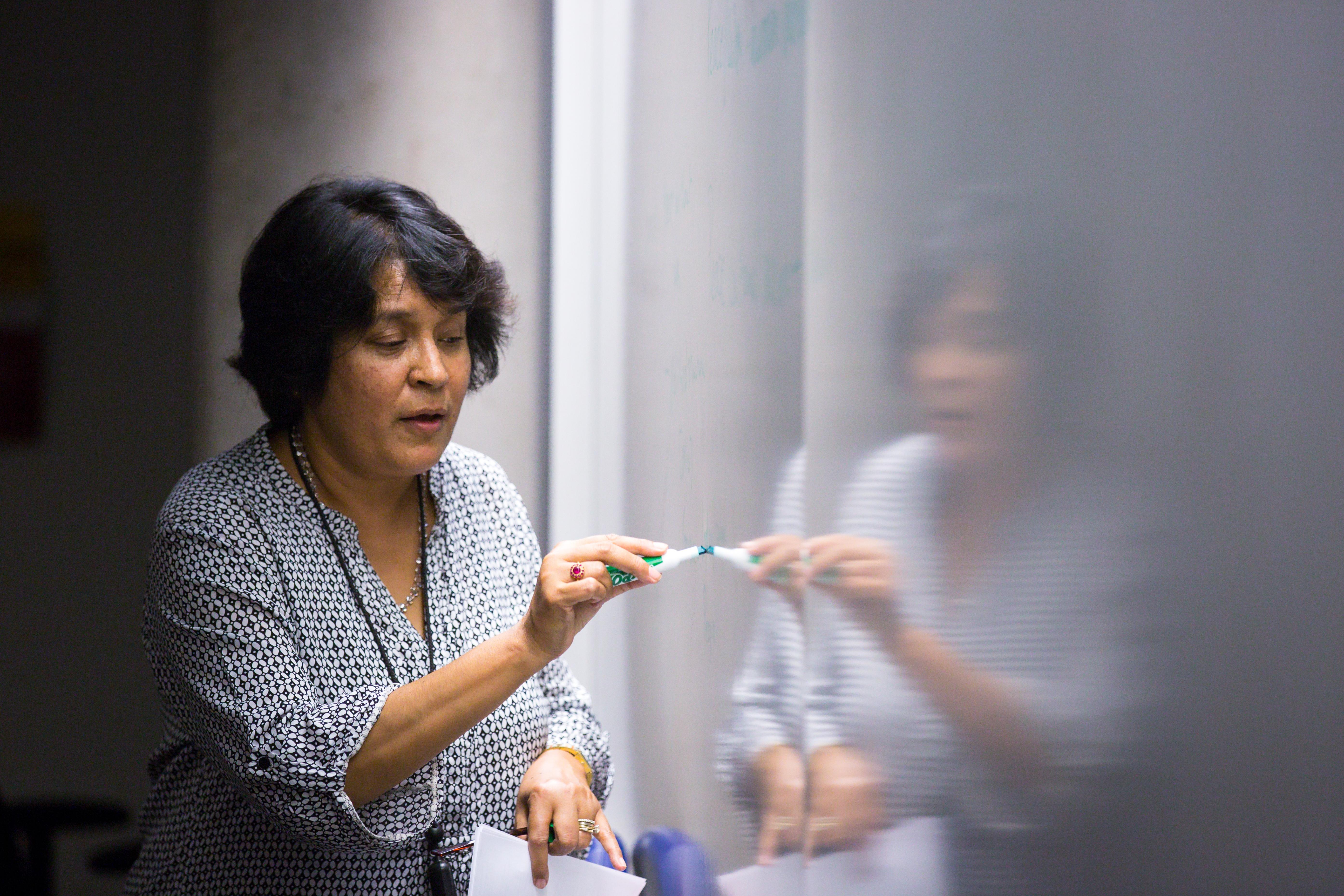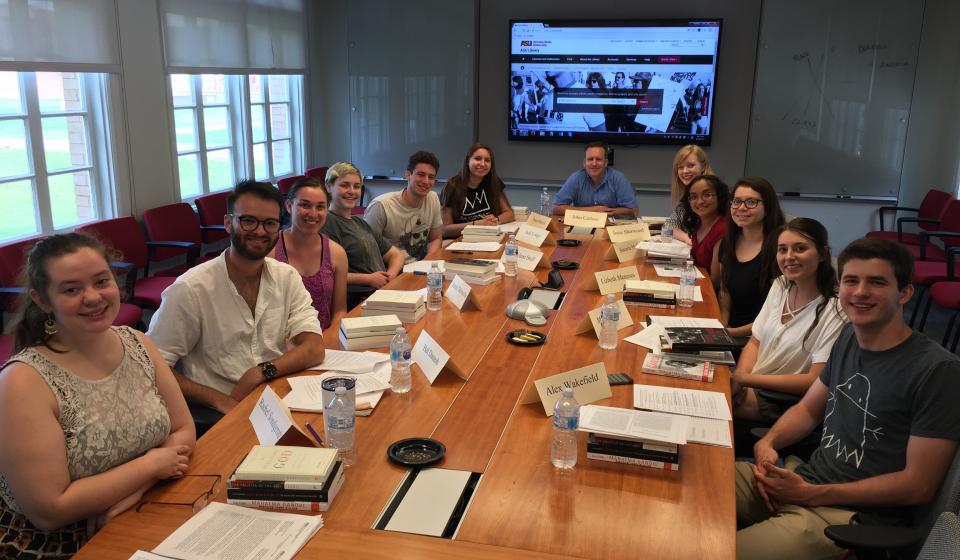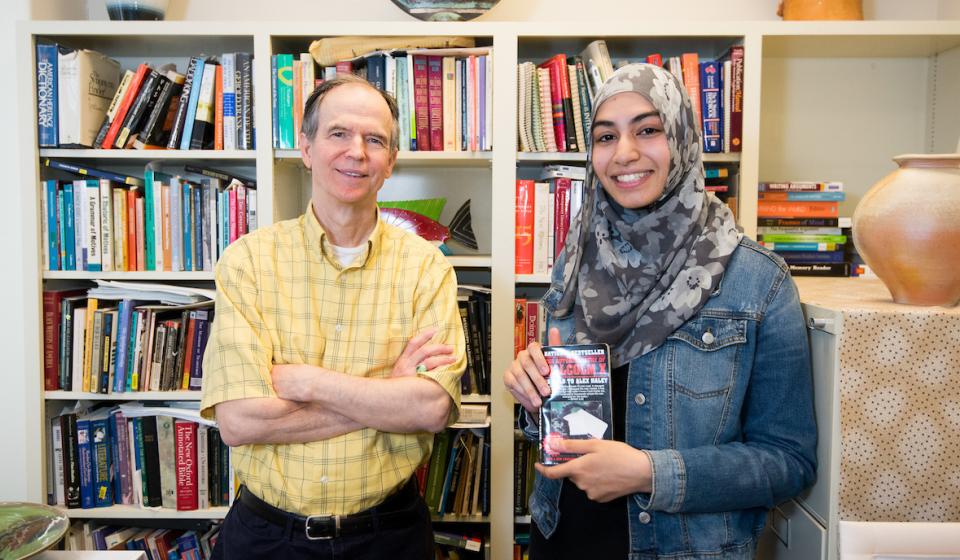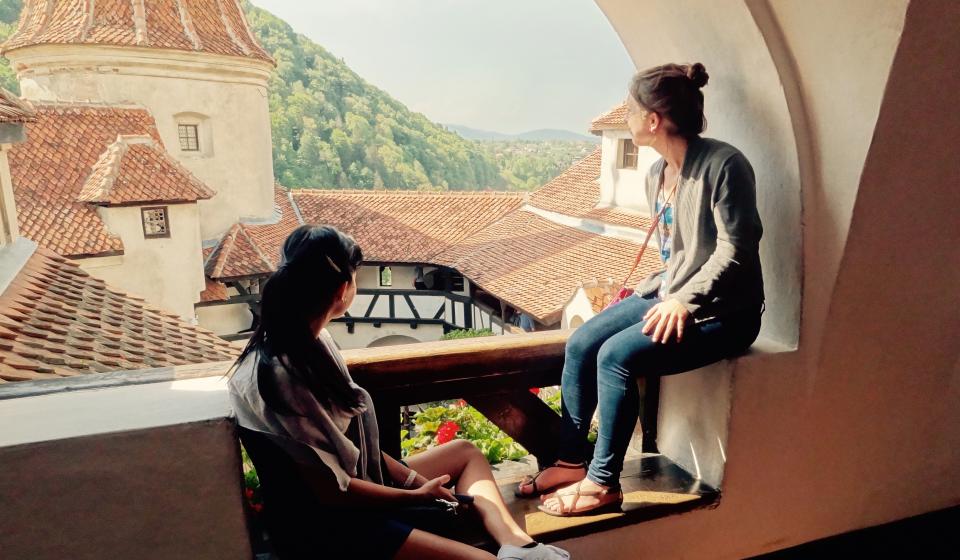
Peace studies at ASU
About
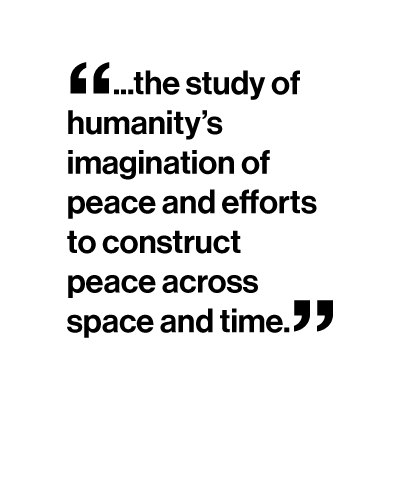
Q: What is "peace studies"?
Peace studies is a broad interdisciplinary field, potentially drawing upon most, if not all, academic disciplines. Peace Studies encompasses the study of humanity’s imagination of peace and efforts to construct peace across space and time. Understanding peace as a dynamic process, it includes many topics, such as: inner peace; interpersonal, intergroup and international relations; conflict resolution; nonviolence and alternatives to violence; and peace education.
Q: How do we study peace?
Rejecting views that peace comes through violence or war, this field explores the possibilities for peace expressed in philosophical, religious, social, political, and spiritual thought, as well as in diverse cultural and artistic forms, social movements, and institutions, both within and across borders. The Hardt-Nickachos Peace Studies Initiative at ASU's Center for the Study of Religion and Conflict shares a commitment to understanding and advancing those ideas, resources and practices that will contribute to a just and lasting peace. The initiative includes public programming, support for new course development, and student scholarships and fellowships.
Building new knowledge
Fostering collaboration and advancing ideas, resources, and projects that will contribute to just and lasting peace
Preparing the future for peace
Empowering the next generation of students with the skills, knowledge, and perspective to contribute to a more peaceable future
Connecting the community
Engaging minds in the discussion of conflict & peacebuilding through public programs, conferences, and workshops
History
Professor emeritus elevates peace studies at ASU
from ASU News | September 12, 2008
ASU professor emerita Annanelle (Ann) Hardt, along with her late husband, Anthony (Tony) Nickachos, has created a named faculty chair at ASU's Center for the Study of Religion and Conflict.
The holder of the Hardt-Nickachos Chair in Peace Studies will lead research and teaching on the ideas, resources and practices that contribute to a sustainable peace; will regularly teach courses in peace studies; provide ongoing leadership and direction in advancing peace studies; and collaborate with other concerned faculty.
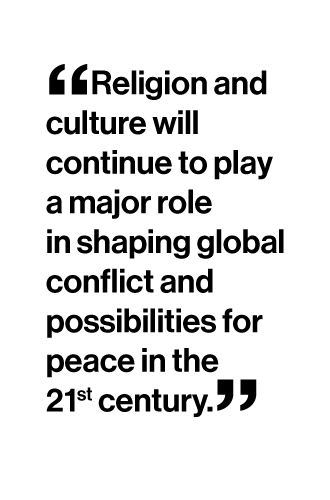
“It has been a privilege to work with Ann Hardt on initiatives related to religion, conflict and peace studies over the past few years,” says the center’s director Linell Cady. “It is wonderful to see a former faculty member make so generous an investment in future teaching excellence. We are gratified by her gift as it enables us to focus on an important aspect of our mission.”
Spreading an understanding of peace was Hardt’s passion as a professor in the College of Education, and it continues to be her passion since her retirement in 1990. During her years at ASU, Hardt taught multicultural education, peace and conflict studies, cooperative learning, elementary education, and school and society. She also directed conferences at ASU on “Alternatives to Violence” and “The Meaning and Control of Conflict.”
“For many years, I wanted ASU to have courses in peace,” Hardt says. “Several times I taught ‘Peace Studies in Education,’ which was modeled after an introductory course for peace majors elsewhere. As a society we have studied war and violence, but have had very little study of peace and non-violence. It’s time to study peace at ASU.”
Hardt has received numerous awards and recognition for her work on behalf of peace. Nickachos was frequently by her side, offering constant support and feedback. He supported her Initiative in Religion, Conflict and Peace Studies at ASU, and encouraged, challenged, supported and helped her formulate some of her critical public statements on peace.
“Tony was the great support of my life,” says Hardt. “He believed in peace, and because of his military background, he was able to keep me honest in my peace activities and statements. As I worked in the community, he expressed his life by personally helping others.”
Nickachos was a retired Navy Lt. Commander. He earned a teaching certificate from the ASU College of Education and taught in the Roosevelt School District in Phoenix. He was known as a kind and giving teacher who often helped students after school.
Peace studies is a broad field applicable to nearly all academic disciplines. It examines the possibilities for non-violence, peace and alternatives to violence expressed throughout human history and culture.
With the Hardt-Nickachos Chair in Peace Studies, ASU is aiming to elevate their profile in this important area. The Hardt-Nickachos gift is leveraging university funds, as well as additional operating support, from the president’s office to ensure that the new chair holder is a nationally recognized, high-level faculty appointment.
“Religion and culture will continue to play a major role in shaping global conflict and possibilities for peace in the 21st century,” Cady says. “This makes the establishment of the Hardt-Nickachos Chair all the more urgent.”
The ASU Foundation raises, invests and manages private funds to benefit Arizona State University and serves as the university’s entrepreneurial arm in technology commercialization, real estate investment and other emerging initiatives. One of Arizona’s oldest 501(c)(3) organizations, the foundation was incorporated in 1955 and currently manages assets exceeding $756 million.
Chair
Meet Yasmin Saikia, Hardt-Nickachos Chair in Peace Studies

Yasmin Saikia is the Hardt-Nickachos Chair in Peace Studies at the Center for the Study of Religion and Conflict and a professor of history in the School of Historical, Philosophical and Religious Studies. Her work focuses on the histories of memory and identity; women, war, and peace; histories of premodern and contemporary South Asia, and engaging the history of Islam and Islamic values of peace. With a specific focus on contestations and accommodations in South Asia between local, national, and religious identities, she examines the Muslim experience in India, Pakistan, and Bangladesh, and the discourse of nonviolence alongside the practice of violence against women and vulnerable groups. As the Hardt-Nickachos Chair in Peace Studies, she advances the study of peace with a more humanities-oriented approach by paying attention to culture, history, and individual and group agency.
Saikia’s expertise and innovative teaching techniques help students at Arizona State University understand peace as a dynamic process touching on dimensions that range from the inner to the interpersonal, and from the intergroup to the international. To encourage student participation she has developed several new classes that have never before been offered at ASU, covering topics ranging from Gandhi and the politics of non-violence to Muslim women’s peace movements.
Saikia is the author of the award-winning books, In the Meadows of Gold: Telling Tales of the Swargadeos at the Crossroads of Assam (1997) and Fragmented Memories: Struggling to Become Tai-Ahom in India (2004). Her three-year oral history project focusing on the Bangladesh war of 1971 led to Women, War, and the Making of Bangladesh: Remembering 1971 (Duke University Press, Durham/Women Unlimited, New Delhi, 2011), in which she examines how women experience post-colonial nation building, and tell, in fractured narratives, a story of violence hidden in the official histories of South Asia. Combining oral interviews with archival research in India, Pakistan, and Bangladesh, Saikia shows how the enduring language of insāniyat (humanity) enables the divided Muslim communities in the subcontinent to make sense of their identity beyond the violence of nation-building, state and religion, probing the possibility of whether dialogue on violence can serve as a transformative site for developing an ethics and language of reconciliation between victims and perpetrators.
Currently, she is editing a trilogy on “People’s Peace.” The first installment focused on women and peace and was released in 2014, the second on everyday peace and lived experiences of peace was released in 2019, and the third volume on peace with the other is forthcoming in 2023.
Events
The Peace Studies initiative regularly hosts lectures, conferences and workshops on peace.
The initiative’s signature event, the Hardt-Nickachos Lecture in Peace Studies, invites distinguished scholars/practitioners to ASU in order to stimulate new thinking and conversations among faculty and students on intersecting dimensions of religion, conflict and peace studies. All lectures, conferences, and related events, past and future, aim to heighten faculty and student awareness of peace studies as an academic field of inquiry and its significance and relevance as an approach to engaging the most challenging problems of our age.
| Date | Event | Speaker | Links |
| October 2021 | The White Savior and the Waif: Listening to Humanitarianism’s Unheard | Keith David Watenpaugh | Video |
| November 2020 | The Warfare State and Alternative | Joseph W. Elder | |
| September 2020 | Telling the Story of the Other | Alice Albinia Anand Gopal | Video |
| November 2019 | Islam, the West, and the Quest for Understanding | Anouar Majid | |
| February 2019 | Surviving Genocide: The Women of Srebrenica Speak | Selma Leydesdorff | Video |
| February 2018 | Global Citizenship in an Age of Anger | Pankaj Mishra | |
| November 2017 | The Warfare State and Alternative Activities | Joseph W. Elder | |
| April 2017 | Peace Studies Film "Salam Neighbor" | David Androff Yasmin Saikia| Aysar Al Khafaji | Trailer |
| September 2015 | Peace Studies Film Series: | ||
| "Flying Paper" | Devorah Manekin | Trailer | |
| "Social Business: A New Path for Capitalism" | Chad Haines | Trailer | |
| "Bidder 70" | Sonja Klinsky | Trailer | |
| "The Imam and the Pastor" | ASU Council of Religious Advisors | Trailer | |
| September 2014 | Peace Studies Film Series: | ||
| "The Square" | Chad Haines | Trailer | |
| "No" | Daniel Rothenberg | Trailer | |
| "Parzania" | Yasmin Saikia | Trailer | |
| "Heart of Jenin" | Amit Ron | Trailer | |
| September 2013 | Actual Peacemaking | Najeeba Syeed-Miller | Podcast |
| March 2013 | Politics, Value, and Alienation | Akeel Bilgrami | Podcast |
| November 2012 | Cosmopolitanism: Dialogue and the Search for Cosmos | Fred Dallmayr | Podcast |
| April 2012 | Religion, Values and the Search for Peace | Sari Nusseibeh | Podcast |
| April 2012 | Peace in Postnormal Times | Ziauddin Sardar | Podcast |
| November 2011 | Nonviolent Change and Reform Today: Lessons from Gandhi | Dennis Dalton | |
| February 2011 | Playing for Peace: A Panel Discussion on Music and Peace | Apple Hill Musicians | |
| September 2010 | "How Do We Teach Peace?" | Yasmin Saikia | Podcast |
| October 2009 | Peaceful Revolutions: Religion, Nonviolence, and Citizen Uprisings in the Late 20th Century | Sharon Erickson Nepstad | Podcast |
| April 2008 | What Do We Mean When We Say We Want Peace? | Ira Chernus | Podcast |
| November 2006 | When Religion Brings Peace, Not War | David R. Smock | Podcast |
| September 2005 | Sacrificing the Sacrifices of War | Stanley Hauerwas |
Peace with the Other
November 7-8, 2019
West Hall, Room 135
ASU Tempe campus
Participants
Angela Banks, Arizona State University; Alexander Avina, Arizona State University; Madelaine Adelman, Arizona State University; Amit R. Baishya, University of Oklahoma; Gaymon Bennett, Arizona State University; Camille Burge, Villanova University; Kathryn Cassidy, Northumbria University Newcastle; Francesco Della Puppa, Ca’ Foscari University in Venice; Tracy Fessenden, Arizona State University; Greta Gaard, University of Wisconsin River Falls; Timothy Grose, Rose-Hulman Institute of Technology in Indiana; Chad Haines, Arizona State University; Anouar Majid, University of New England; Sofian Merabet, The University of Texas at Austin; Frederic Neyrat, University of Wisconsin-Madison; Yasmin Saikia, Arizona State University; David Tabb Stewart, California State University, Long Beach
Imagining Peace in Conflict
February 27, 2018
West Hall, Room 135 | ASU Tempe campus
Participants
William Miles, Northeastern University; Toyin Falola, University of Texas at Austin; Raphael Chijioke Njoku, Idaho State University; Chitralekha Zutshi, College of William and Mary; Haley Duschinski, Ohio University; Ather Zia, University of Northern Colorado; Chad Haines, Arizona State University; Rebecca Stein, Duke University; Magid Shihade, Birzeit University; Paul Beran, Northeastern University; Azra Hromadžić, Syracuse University; Timothy J. White, Xavier University; Luc Reydams, University of Notre Dame
Migration, Refugees and Religious Perspectives
April 27-28, 2017
West Hall, Room 135 | ASU Tempe campus
Participants
Linell Cady, Arizona State University; Louise Cainkar, Marquette University; Evelyn Cruz, Arizona State University; Chad Haines, Arizona State University; Ahmet İçduygu, Koç University; Satvinder Juss, Kings College London; Peggy Levitt, Wellesley College; Julian Lim, Arizona State University; Anna O’Leary, University of Arizona; Yasmin Saikia, Arizona State University; Adam Sutcliffe, Kings College London; Claudia Tazreiter, University of New South Wales
People's Peace: Culture, Agency, Lived Experience
April 16-17, 2015
West Hall, Room 135 | ASU Tempe campus
Participants
Lisa Sowle Cahill, Boston College; David Cortright, Notre Dame University; Hamid Dabashi, Columbia University; Leslie Dwyer, George Mason University; Donald Fixico, Arizona State University; Joel Gereboff, Arizona State University; Charles Griswold, Boston University; Chad Haines, Arizona State University; Bruce Lawrence, Duke University; Amanda Izzo, Saint Louis University; Atalia Omer, Notre Dame University; Yasmin Saikia, Arizona State University; Stuart Barry Schwartz, Yale University; Jackie Smith, University of Pittsburgh; Susan Brooks Thistlethwaite, Chicago Theological Seminary
Contesting Visions of Peace
April 3, 2014
West Hall, Room 135 | ASU Tempe campus
Participants
Samuel Moyn, University of Columbia; Ranabir Samaddar, Director of the Calcutta Research Group; Zillah Eisenstein, Ithaca College; Amyn B. Sajoo, Simon Fraser University
Living Conflicts in India, Pakistan, and Palestine: Religion, Secularism and the Search for Peace
April 14, 2011
West Hall, Room 135 | ASU Tempe campus
Participants
Anand Patwardhan, filmmaker; Fazeelat Aslam, filmmaker; Furrukh Khan, filmmaker; Jim Hanon, filmmaker; Issam Nassar, Illinois State University
Women, Islam and Peacebuilding
March 10-11, 2011
West Hall, Room 135 | ASU Tempe campus
Participants
Miriam Cooke, Duke University; Asna Husin, Ar-Raniry State Institute for Islamic Studies; Souad Ali, Arizona State University; Karim Crow, International Institute of Advanced Islamic Studies Malaysia; Abdullah Antepli, Duke Divinity School; Arzoo Osanloo, University of Washington; Shahla Talebi, Arizona State University; Elora Halim Chowdhury, University of Massachusetts; S. Ayse Kadayifci-Orellana, American University; Mukhtar Mai, Mukhtar Mai Women’s Welfare Organization; Richard C. Martin, Emory University
What Do We Mean When We Say We Want Peace?
April 10, 2008
Great Hall, Armstrong Hall | ASU Tempe campus
Participants
Ira Chernus, University of Colorado; Robert W. Hanning, Columbia; Diane Wolfthal, Rice University; Peter Suwarno, Arizona State University; Robert LaBarge, Arizona State University; Eugene Clay, Arizona State University; James Foard, Arizona State University; Miriam Elman, Syracuse University; Keith Miller, Arizona State University; Clark A. Miller, Arizona State University; Patricia Friedrich, Arizona State University
Projects

Refugees and Migration
Refugees and Migration is an ongoing project that explores humanistic approaches to diverse political, religious, economic, and social processes involved in the making and managing of refugees (and various forms of the “other”), for developing a new approach to the study and practice of peace. Our current moment carries a sense of urgency as the circles of exclusion from peace are expanding: divisive political trends triumph the logic of discrimination against religious, racial, gender, and other minorities; asymmetrical war and violence are creating ever increasing numbers of refugees and displaced communities; and the natural environment is under attack, portending massive climate changes that can no longer be ignored or wished away. These are all massive issues threatening almost all segments of human life in the twenty first century. Comprehensive interdisciplinary and holistic methods are needed to widen the lens of exploration and suggest new ways for creating an inclusive approach to peace.
The Refugees and Migration project, led by Yasmin Saikia, the Hardt-Nickachos Chair in Peace Studies at ASU, includes public events, workshops, conferences, seed funding to research projects by affiliated faculty, publications, and new and innovative research projects being undertaken across the globe.
Yasmin Saikia
Hardt-Nickachos Chair in Peace Studies and Professor of History
Chad Haines
Associate Professor of Religious Studies
"Faith-Based Responses to Migrants and Refugees in Comparative Urban Spaces: Religious Aid and Gender Dependence in Phoenix, AZ and Berlin, Germany"
Sujey Vega and Christiane Reves
“Strangers in Our Midst: Muslim Refugees, Precarity, and Urbanism in South Asia”
Chad Haines
"Neighbors Table: Latino Immigrant Family Narratives, Dialogue, and Integration with the Evangelical Church"
Douglas Kelley
"Religion or Ethnicity? Public Attitudes Towards Refugees in Hungary and the Czech Republic"
Lenka Bustikova
PLuS Alliance
Satvinder Juss, Kings College London
Claudia Tazreiter, University of New South Wales
Publications
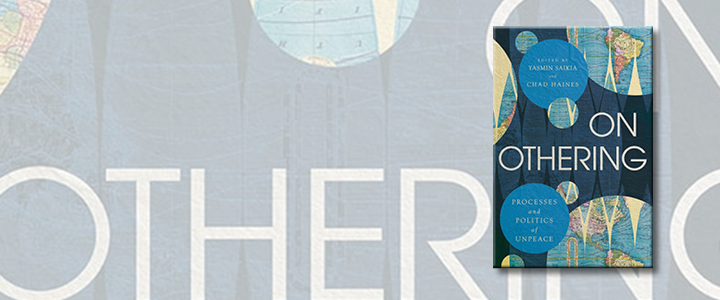
On Othering: Processes and Politics of Unpeace
Edited by Yasmin Saikia and Chad Haines
Athabasca University Press, 2024
In every sphere of life, division and intolerance have polarized communities and entire nations. The learned construction of the Other—an evil “enemy” against whom both physical and discursive violence is deemed acceptable—has fractured humanity, creating divisions that seemingly defy reconciliation. How do we restore the bonds of connection among human beings? How do we shift from polarization to peace?
On Othering: Processes and Politics of Unpeace examines the process of othering from an international perspective and considers how it undermines peacemaking and is perpetuated by colonialism and globalization. Taking a humanistic approach, contributors argue that celebrating differences can have a transformative change in seeking peaceful solutions to problems created by people, institutions, ideas, conditions, and circumstances. Touching on race, gender, sexuality, nationalism, and our relationship with the natural world, this volume attends to the deep injustices brought about by othering and recommends actions for mending the relationships that are essential to renewing the possibility of peace.
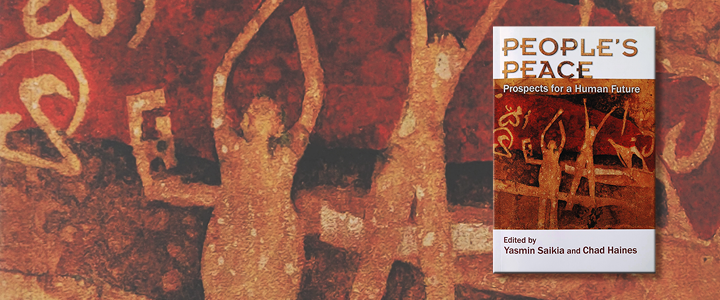
People's Peace: Prospects for a Human Future
Edited by Yasmin Saikia and Chad Haines
Syracuse University Press, 2019
People's Peace lays a solid foundation for the argument that global peace is possible because ordinary people are its architects. Saikia and Haines offer a unique and imaginative perspective on people's daily lives across the world as they struggle to create peace despite escalating political violence. The volume's focus on local and ordinary efforts highlights peace as a lived experience that goes beyond national and international peace efforts. In addition, the contributors emphasis on the role of religion as a catalyst for peace moves away from the usual depiction of religion as a source of divisiveness and conflict.
Spanning a range of humanities disciplines, the essays in this volume provide case studies of individuals defying authority or overcoming cultural stigmas to create peaceful relations in their communities. From investigating how ancient Jews established communal justice to exploring how black and white citizens in Ferguson, Missouri, are working to achieve racial harmony, the contributors find that people are acting independently of governments and institutions to identify everyday methods of coexisting with others. In putting these various approaches in dialogue with each other, this volume produces a theoretical intervention that shifts the study of peace away from national and international organizations and institutions toward locating successful peaceful efforts in the everyday lives of individuals.
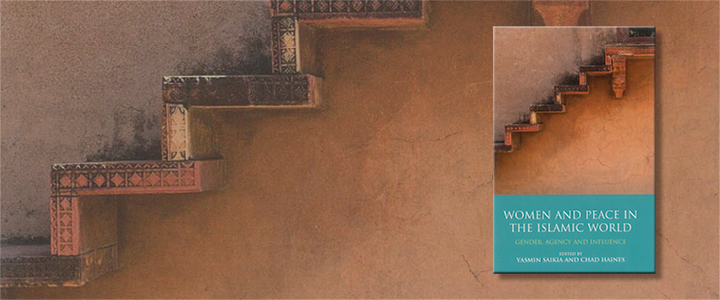
Women and Peace in the Islamic World Gender, Agency and Influence
Edited by Yasmin Saikia and Chad Haines
London: I.B. Tauris, 2014
How realistic is the prospect of peace in the Muslim world? This question is the predominant focus for global analysis today, but its debate frequently ignores the cultural and social complexity of the Muslim world, reducing it into a system of states and select actors. This book addresses such a failing by exploring how the everyday interactions of women, in accordance with Islamic personal ethics, can offer the world a new interpretation of peace. In particular, it focuses on the women in Islamic societies, from Aceh to Bosnia, Morocco to Bangladesh, initiating a dialogue on the role of these women in peacemaking. This concentration upon the complex issues of the everyday both enables a detailed exploration of how people conceptualise peace and opens up new frameworks for conflict resolution. The discussions that emerge lead to a critical questioning of assumptions about peace as a state policy and cessation of violence. Drawing upon original research from different parts of the Middle East, North Africa and Asia, including Iran, India, Afghanistan, Bangladesh, Bosnia, Egypt and Sudan, the contributors offer a refreshing new look at Muslim women as peacemakers, challenging any assumptions of Islam as an inherently violent religion. Such a timely work provides new and important analyses on the role of Muslim women in forging new pathways of peace in the contemporary world.
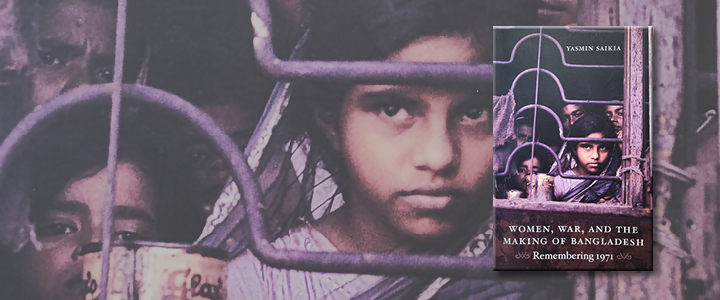
Women, War, and the Making of Bangladesh: Remembering 1971
Yasmin Saikia
Duke University Press, Durham, 2011
Fought between India and what was then East and West Pakistan, the war of 1971 led to the creation of Bangladesh, where it is remembered as the War of Liberation. For India, the war represents a triumphant settling of scores with Pakistan. If the war is acknowledged in Pakistan, it is cast as an act of betrayal by the Bengalis. None of these nationalist histories convey the human cost of the war. Pakistani and Indian soldiers and Bengali militiamen raped and tortured women on a mass scale. In Women, War, and the Making of Bangladesh, survivors tell their stories, revealing the power of speaking that deemed unspeakable. They talk of victimization—of rape, loss of status and citizenship, and the “war babies” born after 1971. The women also speak as agents of change, as social workers, caregivers, and wartime fighters. In the conclusion, men who terrorized women during the war recollect their wartime brutality and their postwar efforts to achieve a sense of humanity. Women, War, and the Making of Bangladesh sheds new light on the relationship among nation, history, and gender in postcolonial South Asia.
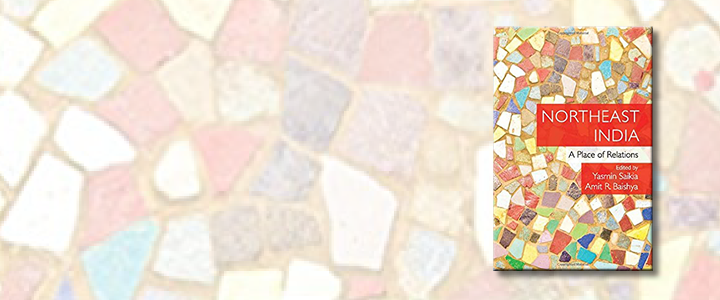
Northeast India: A Place of Relations
Edited by Yasmin Saikia and Amit R. Baishya
Cambridge University Press
Northeast India: A Place of Relations focuses on encounters and experiences between people and cultures, the human and the non-human world, allowing for building of new relationships of friendship and amity in the region. The twelve essays in this volume explore the possibility of a new search enabling a 'discovery' of the lived and the loved world of Northeast India from within. The volume employs a variety of perspectives and methodological approaches - literary, historical, anthropological, interpretative politics, and an analytical study of contemporary issues, engaging the people, cultures, and histories in the Northeast with a new outlook. In the study, the region emerges as a place of new happenings in which there is the possibility of continuous expansion of the horizon of history and issues of current relevance facilitating new voices and narratives that circulate and create bonding in the borderland of South, East, and Southeast Asia.
Students
Peace Studies courses
Ways for students to get involved
Participate in the Center's student programs
Earn a certificate in Religion, Conflict and Peace while taking peace studies courses, apply for scholarships to study these topics at ASU and abroad, and more
Apply for a scholarship
- Friends of the Center Award funds travel or study the dynamics of religion, conflict, and peace
- Ansari Travel Scholarship in Religion and International Affairs funds travel to carry out research, attend specialized training, or participate in an internship related to the study of religion in international affairs
Consider a concentration in Peace Studies
Earn a degree in Social and Cultural Analysis with a Peace Studies concentration. Learn more about the concentration and its requirements and other program opportunities


